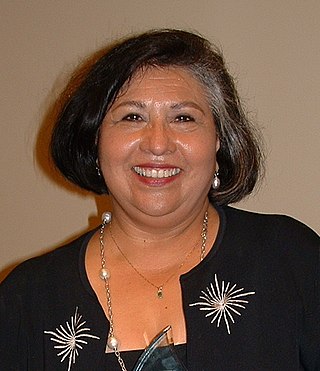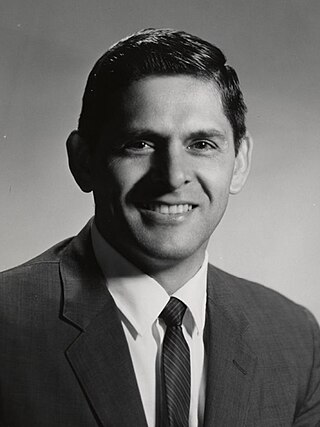Related Research Articles

Jesús Gloria Molina was an American politician who served as a member of the Los Angeles City Council, the California State Assembly, the Los Angeles County Board of Supervisors and the Los Angeles County Metropolitan Transportation Authority.

The Comisión Femenil Mexicana Nacional was a Mexican-American organization dedicated to economically and politically empowering Chicana women in the United States.

Julian Nava was an American educator and diplomat. A member of the Democratic Party, Nava served as the United States Ambassador to Mexico from 1980 to 1981.

The East Los Angeles Walkouts or Chicano Blowouts were a series of 1968 protests by Chicano students against unequal conditions in Los Angeles Unified School District high schools. The first walkout occurred on March 5, 1968. The students who organized and carried out the protests were primarily concerned with the quality of their education. This movement, which involved thousands of students in the Los Angeles area, was identified as "the first major mass protest against racism undertaken by Mexican-Americans in the history of the United States".

Salvador B. Castro was a Mexican-American educator and activist. He was most well known for his role in the 1968 East Los Angeles high school walkouts, a series of protests against unequal conditions in Los Angeles Unified School District (LAUSD) schools. After he retired from teaching, he continued to lecture about his experiences and the importance of education, especially for Mexican Americans.

Jennifer Ann Oropeza was the California State Senator for the 28th district which included the cities of Carson, El Segundo, Hermosa Beach, Lomita, Manhattan Beach, Redondo Beach, and Torrance; the Los Angeles communities of Cheviot Hills, Bel Air, Harbor City, Harbor Gateway, Lennox, Mar Vista, Marina del Rey, Palms, Playa del Rey, Rancho Park, San Pedro, West Los Angeles, Westchester, Wilmington and Venice; and part of the city of Long Beach.

Mari-Luci Jaramillo was an American educator and diplomat who served as U.S. Ambassador to Honduras from 1977 to 1980. Upon her confirmation, Jaramillo became the first Mexican-American woman to serve as an American ambassador.
Monica Cecilia Lozano is the president of the College Futures Foundation, based in San Francisco. Previously she was an American newspaper editor, the publisher and CEO of La Opinión and CEO of its parent company, ImpreMedia, LLC. Based in Los Angeles, La Opinión is the largest Spanish publication in the United States. She was a member of President Obama's Economic Recovery Advisory Board. She was appointed by the California State Legislature to join Governor Arnold Schwarzenegger's Commission on the 21st Century Economy.

Maria Contreras-Sweet is an American businesswoman and former government official who served as the 24th Administrator of the Small Business Administration from 2014 to 2017. She was the executive chairwoman and founder of ProAmérica Bank, a commercial bank focusing on small to mid-sized businesses with a specialty in the Latino community. Born in Guadalajara, Mexico, Contreras-Sweet immigrated to Los Angeles, California and has since been involved in both the private sector founding a private equity firm and in public service as the California Secretary of Business, Transportation, and Housing under Governor Gray Davis.

Antonia Darder is a Puerto Rican and American scholar, artist, poet and activist. She holds the Leavey Presidential Endowed Chair in Ethics and Moral Leadership in the School of Education at Loyola Marymount University. She also is Professor Emerita of Educational Policy, Organization, and Leadership at the University of Illinois at Urbana-Champaign.

Susana Chávez-Silverman is a U.S. Latina writer and professor of Romance Languages and Literatures at Pomona College in Claremont, California.
Roberta H. Martinez is an American writer. She is probably best known for her 2009 book, Latinos in Pasadena.

Alejandra Campoverdi is an American women’s health advocate, best-selling author, and former White House aide. Under President Barack Obama, Campoverdi was the first White House Deputy Director of Hispanic Media.
Patty Rodriguez is an American entrepreneur, producer, radio personality and best-selling author. Rodriguez is co-founder of Lil' Libros, a bilingual children's publishing company, and founder of the MALA by Patty Rodriguez jewellery line. She is currently senior producer of On Air with Ryan Seacrest, In 2016, Rodriguez led a grassroots campaign that convinced MAC Cosmetics to create a collection honouring the late Tejano superstar Selena Quintanilla.

Antonia Hernández is an attorney, activist, and philanthropist. She currently serves as president and CEO of the California Community Foundation. Hernández was counsel for the plaintiffs in Madrigal v. Quilligan (1975), a class-action lawsuit filed by ten women of Mexican descent who were involuntarily sterilized at the Los Angeles County Hospital. She is also the first Latina woman to serve as staff counsel to the U.S. Senate Judiciary Committee from 1979 to 1980. In addition, Hernández served on the campaign team for Senator Ted Kennedy in his 1980 presidential campaign. She served as president and general counsel of the Mexican American Legal Defense and Education Fund (MALDEF) from 1985 to 2004.

María Guadalupe Evangelina de López (1881-1977) was an American activist in the Women's suffrage movement in California. In the 1910s, she campaigned and translated at rallies in Southern California, where suffragists distributed tens of thousands of pamphlets in Spanish.
Ana Celia Zentella is an American linguist known for her "anthro-political" approach to linguistic research and expertise on multilingualism, linguistic diversity, and language intolerance, especially in relation to U.S. Latino languages and communities. She is Professor Emerita of Ethnic Studies at the University of California, San Diego.

The Torristas and Molinistas were groups involved a political feud in Los Angeles, California, in the latter part of the 20th century. Derived from the names of the three main leaders of the two camps, the term is akin to the Montagues and Capulets or the Hatfields and McCoys. The feud, concentrated in Eastside Los Angeles, began with the election of Art Torres and Richard Alatorre, whose supporters were called "Torristas." The rivalry originated when Gloria Molina ran for the California State Assembly in 1982 against Richard Polanco, despite advice from Torres's group to refrain. Molina's supporters, known as "Molinistas," clashed with the Torristas. This rivalry continued until the early 2000s, when the influence of both groups waned as new Latino politicians emerged.
Victoria "Vickie" Castro is an American educator and political activist known for her work with the Young Citizens for Community Action, Brown Berets, and the East L.A. walkouts. Castro went on to work for the Los Angeles Unified School District, and eventually ran for office becoming a member of the LA School Board.

María Luisa Legarra Urquides was an American educator and proponent of bilingual education. She spent her life in the US state of Arizona, but influenced national educational policies. Urquides served in local and federal roles, and received numerous awards and recognitions for her educational leadership and community work. She has been referred to as the "Mother of Bilingual Education" in the United States. She was inducted into the Arizona Women's Hall of Fame in 2002.
References
- ↑ Garza, Hedda (1994), Latinas: Hispanic Women in the United States, Hispanic experience in the Americas, UNM Press, p. 138, ISBN 9780826323606 .
- 1 2 3 "The Papers of Leticia Quezada: A Life Dedicated to Honor Mexican and American Cultural Values" . Retrieved 2016-07-31– via Huntington Library.
- 1 2 3 4 5 Reinhold, Robert (November 29, 1992), "Conversations/Leticia Quezada; L.A.'s Schools Chief Wants Power, And the Vote, for Immigrant Parents", Week in Review, The New York Times
- 1 2 3 4 5 6 7 8 Quintanilla, Michael (January 28, 1990), "Voice of Experience : Painful Memories Buoy Leticia Quezada's Fight for Bilingual Schools", Los Angeles Times , retrieved 2016-07-31
- 1 2 3 4 Mishra, Ram Kumar; Jhunjhunwala, Shital (2013), Diversity and the Effective Corporate Board, Academic Press, p. 110, ISBN 9780124105324 .
- 1 2 Savage, David G. (July 26, 1985), "Latina to Join L.A. Community College Board", Los Angeles Times , retrieved 2016-07-31.
- ↑ Bauman, Robert (2014), Race and the War on Poverty: From Watts to East L.A., Race and Culture in the American West, vol. 3, University of Oklahoma Press, p. 127, ISBN 9780806185200 .
- 1 2 3 Erickson, Lowell Janes (1997), The Los Angeles Community College District Crisis, 1981–1987 (PDF), Los Angeles Valley College, pp. 20, 86.
- ↑ Mathews, Jay (May 31, 1984), "California Latinos Ardently Wooed by Uncertain Suitors", The Washington Post , retrieved 2016-08-01.
- ↑ "The Papers of Leticia Quezada: A Life Dedicated to Honor Mexican and American Cultural Values" – via Huntington Library.
- ↑ Hayduk, Ron (2012), Democracy for All: Restoring Immigrant Voting Rights in the U.S., Routledge, p. 136, ISBN 9781136791352 .
- ↑ Renshon, Stanley Allen (2009), Noncitizen Voting and American Democracy, Rowman & Littlefield, p. 60, ISBN 9780742562653 .
- ↑ Mathews, Jay (January 24, 1990), "Los Angeles schools drop no-pass, no-play rule", The Washington Post , retrieved 2016-08-01.
- ↑ Jones, Charisse (July 7, 1992), "Quezada Is 1st Latina to Head L. A. Schools", Los Angeles Times , retrieved 2016-08-01.
- ↑ "Los Angeles Schools to Hire Bilingual Teachers From Mexico", The New York Times , August 4, 1993, retrieved 2016-07-31.
- 1 2 Pyle, Amy (December 15, 1994), "Quezada Won't Seek Another Term on L.A. School Board", Los Angeles Times , retrieved 2016-07-31.
- ↑ Chu, Henry (July 12, 1992), "Latina President on the Defensive in New District : Leticia Quezada: She calls for unity. But area activists bemoan a loss of representation and are reluctant to accept their new voices on the board", Los Angeles Times , retrieved 2016-08-01.
- ↑ Spolar, Christine; Claiborne, William (January 24, 1994), "Quake aid checks dispatched as FEMA mobilizes more staff and rain holds off", The Washington Post , retrieved 2016-08-01.
- ↑ Acuña, Rodolfo (1996), Anything But Mexican: Chicanos in Contemporary Los Angeles, Haymarket, Verso, p. 99, ISBN 9781859840313 .
- ↑ Gold, Matea (April 18, 1996), "Changing the Mainstream: Mexican Cultural Institute Works to Promote Cultural Vibrancy and Heritage", Los Angeles Times , retrieved 2016-07-31.
- ↑ Starr, Kevin (2011), Coast of Dreams, Knopf Doubleday Publishing Group, p. 155, ISBN 9780307795267 .
- ↑ James, David E. (2003), The Sons and Daughters of Los: Culture and Community in L. A., Temple University Press, p. 155, ISBN 9781439901373 .
- 1 2 "Extended Learning: Branching Out" (PDF), College News, CSUSB Magazine, California State University, San Bernardino, p. 13, Winter 2008.